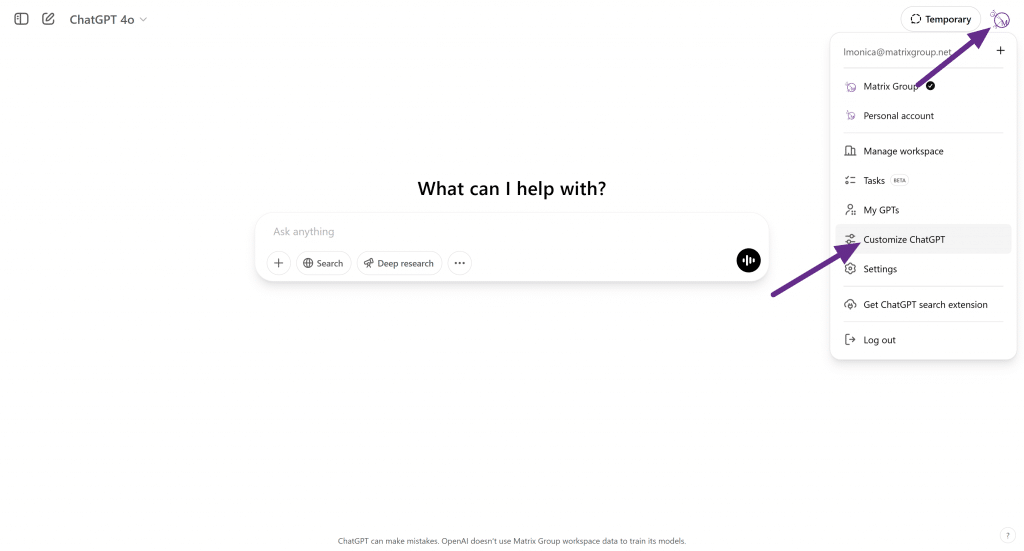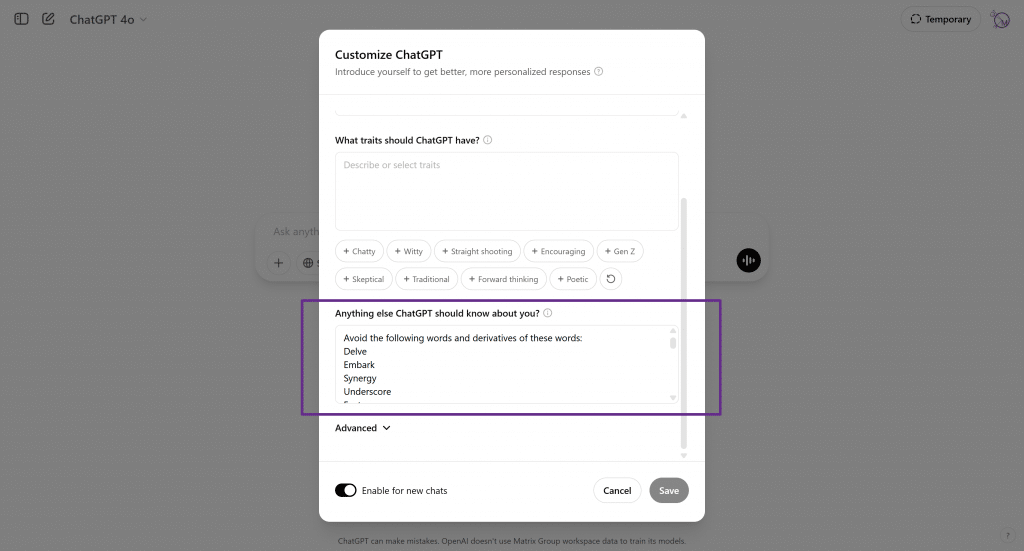CEO Joanna Pineda and I have a running joke that whenever we see “delve” and “embark” used in the same paragraph (even better if it’s the same sentence) we wager a lot that AI was involved in the drafting.
If you’ve been using AI tools like ChatGPT for content creation, you’ve probably noticed this, too. AI definitely favors certain words – tapestry, synergy, foster, beacon, treasure trove. And while there’s nothing wrong with these words, overuse of them (whether AI generated or not) can make people think your content is AI-generated, which can impact credibility.
So how do you make sure ChatGPT avoids these words, or other words that don’t sound like you, when helping you to draft or edit content? We’ve been experimenting with this a lot at Matrix Group, and one of the most helpful techniques I’ve found is building and refining a personal word exclusion list. Here’s how to do it:
Step 1: Identify Words You Want to Avoid
The first step is to figure out which words don’t work for you and make a list of them. This can include words that are common in AI outputs AND words your organization likes to avoid—maybe they’re too corporate, too cliché, or just don’t match your brand’s voice.
A few ways to pinpoint words to avoid:
- Look at past content. Compare AI-generated text to your own writing. Do you naturally avoid words like leverage or paramount? If so, add them to the exclusion list.
- Watch for AI patterns. If you keep seeing the same phrases pop up in AI responses, they’re probably overused.
- Do some research. There are also many blog posts and Reddit threads that list overused AI words, some of which are industry-specific; these blog posts can be very helpful.
- Gut check. If a word makes you cringe every time you see it, it’s worth cutting, whether it’s commonly used by AI or not.
Way before AI, Matrix Group had a list of words that, while commonly used in our industry, didn’t match our brand voice, so we agreed to strike from our communications and marketing. Identify words like that, too!
Here is a list of words that I personally exclude because they show up too often in AI-generated content AND are words I wouldn’t commonly use in my own writing:
Delve, Embark, Synergy, Underscore, Foster, Groundbreaking, Game changer, Endeavor, Enlighten, Esteemed, Shed light, Tapestry, Treasure trove, Testament, Peril, Amplify, Beacon, Convey, Resonate, Interplay, Adhere, Paramount, Furthermore, Profound, Indelible, Bespoke, Cognizant, Encompass, Hitherto, Leverage, Realm, Utilize.
Keep a running list of your “exclude” words in an easy to access place like a Google doc.
Step 2: Guide ChatGPT with Custom Prompts and Settings
Once you’ve got your list, you have two ways to guide ChatGPT (or any AI tool) to avoid these words:
1. Customize Prompts as You Go
You can instruct your AI tool with every prompt:
“Write a blog post about AI customization. Do not use the following words or derivatives of the words: delve, embark, synergy, utilize, leverage, foster….”.
This method is great for flexibility, but it requires extra effort every time you prompt the AI.
2. Set Permanent Exclusions (If Your Tool Allows It)
Some AI tools allow you to set global preferences, which is a huge help. While ChatGPT doesn’t have a built-in “ban list” for words (yet), there IS a way to customize your account so that it avoids your list of words. Here’s how:
Navigate to your account, and click on “Customize ChatGPT.”

Scroll down to “Anything else ChatGPT should know about you?” and enter the following:
Avoid the following words and derivatives of these words:
[Your Word List Goes Here]

Save, and you’re done!
Step 3: Audit and Adjust Your Exclusion List Often
Once you’ve built your exclusion list, the next step is staying flexible. It’s easy to get carried away and try to cut every word that feels even remotely “AI-generated,” but overcorrecting can be just as limiting as not correcting at all.
Your list of banned words should be a living document, not a permanent rulebook. Check your list regularly. If your writing starts feeling too stripped down or bland, it might be because your exclusions list is too long. Or, if new patterns start creeping into your AI drafts, consider adding those words or phrases to the list.
Here’s the balance we’ve found that works best:
- Keep your global exclusions minimal. Save the big offenders (like delve and embark) for your always-off list.
- Use prompt-level exclusions for everything else. When you want to avoid specific words in a particular piece of content, include those directions in the prompt instead of your default settings.
Also keep in mind that even the best AI outputs will never sound perfectly you, because they’re not! Sometimes the best thing to do is simply edit words here and there to make them sound more like you, without having to ban certain words and phrases entirely. ChatGPT should help you draft your content, not write it in its entirety. In my experience, ChatGPT can get me started, but then I edit heavily to put heart back into my writing, and make it sound authentically me or authentically Matrix Group.
Remember, AI can be an amazing tool, but it works best when it reflects your brand’s unique voice. By identifying overused words and guiding ChatGPT to avoid them, you’ll get results that sound more natural, more original, and more you.
Give it a try! Next time you generate content, test out a prompt that includes exclusions, and see how it changes the output.
What words do you avoid in writing? Let’s compare notes!



